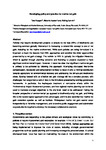Developing policy and practice for marine net gain
| dc.contributor.author | Hooper, T | |
| dc.contributor.author | Austen, Melanie | |
| dc.contributor.author | Lannin, A | |
| dc.date.accessioned | 2020-10-01T11:09:30Z | |
| dc.date.issued | 2020-10-01 | |
| dc.identifier.issn | 0301-4797 | |
| dc.identifier.issn | 1095-8630 | |
| dc.identifier.other | 111387 | |
| dc.identifier.uri | http://hdl.handle.net/10026.1/16464 | |
| dc.description.abstract |
Policies that require development projects to ensure no net loss (NNL) of biodiversity are becoming common globally. Momentum is increasing to extend this concept to one of net gain, including for the marine environment. While such policies are being formulated it is important to learn the lessons from NNL approaches and consider the wider opportunities presented by a net gain strategy. The vehicle for NNL is typically the mitigation hierarchy, which is applied through planning consents and licensing to projects expected to have significant environmental impact. However, it becomes clear that significant marine net gain is unlikely to be achieved by following this approach. Attempting site-based like-for-like compensation, restoration and enhancement is likely to result in only a minimal contribution towards aspirations for environmental recovery and addressing the climate and biodiversity crises. Moving forward with an effective net gain strategy will be a complex process, with challenges that range from a lack of data to the limitations presented by existing governance frameworks. In particular, the inadequate treatment of cumulative effects within the Environmental Impact Assessment process, and how regional marine planning can be better used to translate strategic objectives to the site level, need to be addressed. Taking the broader perspective of environmental (as opposed to biodiversity-only) net gain, and linking this to the natural capital approach offers advantages, and it is also essential that marine net gain considers species as well as habitats. Widespread marine net gain cannot occur independently of fisheries management, and extensive public engagement and stakeholder co-production is required to develop the necessary collaborative solutions. | |
| dc.format.extent | 111387-111387 | |
| dc.format.medium | Print-Electronic | |
| dc.language | en | |
| dc.language.iso | en | |
| dc.publisher | Elsevier BV | |
| dc.subject | Net gain | |
| dc.subject | Natural capital | |
| dc.subject | Ecosystem services | |
| dc.subject | Marine planning | |
| dc.subject | Offsetting | |
| dc.title | Developing policy and practice for marine net gain | |
| dc.type | journal-article | |
| dc.type | Journal Article | |
| dc.type | Review | |
| plymouth.author-url | https://www.webofscience.com/api/gateway?GWVersion=2&SrcApp=PARTNER_APP&SrcAuth=LinksAMR&KeyUT=WOS:000593974400006&DestLinkType=FullRecord&DestApp=ALL_WOS&UsrCustomerID=11bb513d99f797142bcfeffcc58ea008 | |
| plymouth.volume | 277 | |
| plymouth.publication-status | Published | |
| plymouth.journal | Journal of Environmental Management | |
| dc.identifier.doi | 10.1016/j.jenvman.2020.111387 | |
| plymouth.organisational-group | /Plymouth | |
| plymouth.organisational-group | /Plymouth/Faculty of Science and Engineering | |
| plymouth.organisational-group | /Plymouth/Faculty of Science and Engineering/School of Biological and Marine Sciences | |
| plymouth.organisational-group | /Plymouth/REF 2021 Researchers by UoA | |
| plymouth.organisational-group | /Plymouth/REF 2021 Researchers by UoA/UoA07 Earth Systems and Environmental Sciences | |
| plymouth.organisational-group | /Plymouth/REF 2021 Researchers by UoA/UoA14 Geography and Environmental Studies | |
| plymouth.organisational-group | /Plymouth/REF 2021 Researchers by UoA/UoA14 Geography and Environmental Studies/UoA14 Geography and Environmental Studies MANUAL | |
| plymouth.organisational-group | /Plymouth/Users by role | |
| plymouth.organisational-group | /Plymouth/Users by role/Academics | |
| plymouth.organisational-group | /Plymouth/Users by role/Researchers in ResearchFish submission | |
| dc.publisher.place | England | |
| dcterms.dateAccepted | 2020-09-19 | |
| dc.rights.embargodate | 2021-10-1 | |
| dc.identifier.eissn | 1095-8630 | |
| dc.rights.embargoperiod | Not known | |
| rioxxterms.funder | Natural Environment Research Council | |
| rioxxterms.identifier.project | GCRF Building capacity for sustainable interactions with marine ecosystems for health, wellbeing, food and livelihoods of coastal communities | |
| rioxxterms.versionofrecord | 10.1016/j.jenvman.2020.111387 | |
| rioxxterms.licenseref.uri | http://www.rioxx.net/licenses/all-rights-reserved | |
| rioxxterms.licenseref.startdate | 2020-10-01 | |
| rioxxterms.type | Journal Article/Review | |
| plymouth.funder | GCRF Building capacity for sustainable interactions with marine ecosystems for health, wellbeing, food and livelihoods of coastal communities::Natural Environment Research Council | |
| plymouth.funder | GCRF Building capacity for sustainable interactions with marine ecosystems for health, wellbeing, food and livelihoods of coastal communities::Natural Environment Research Council |


